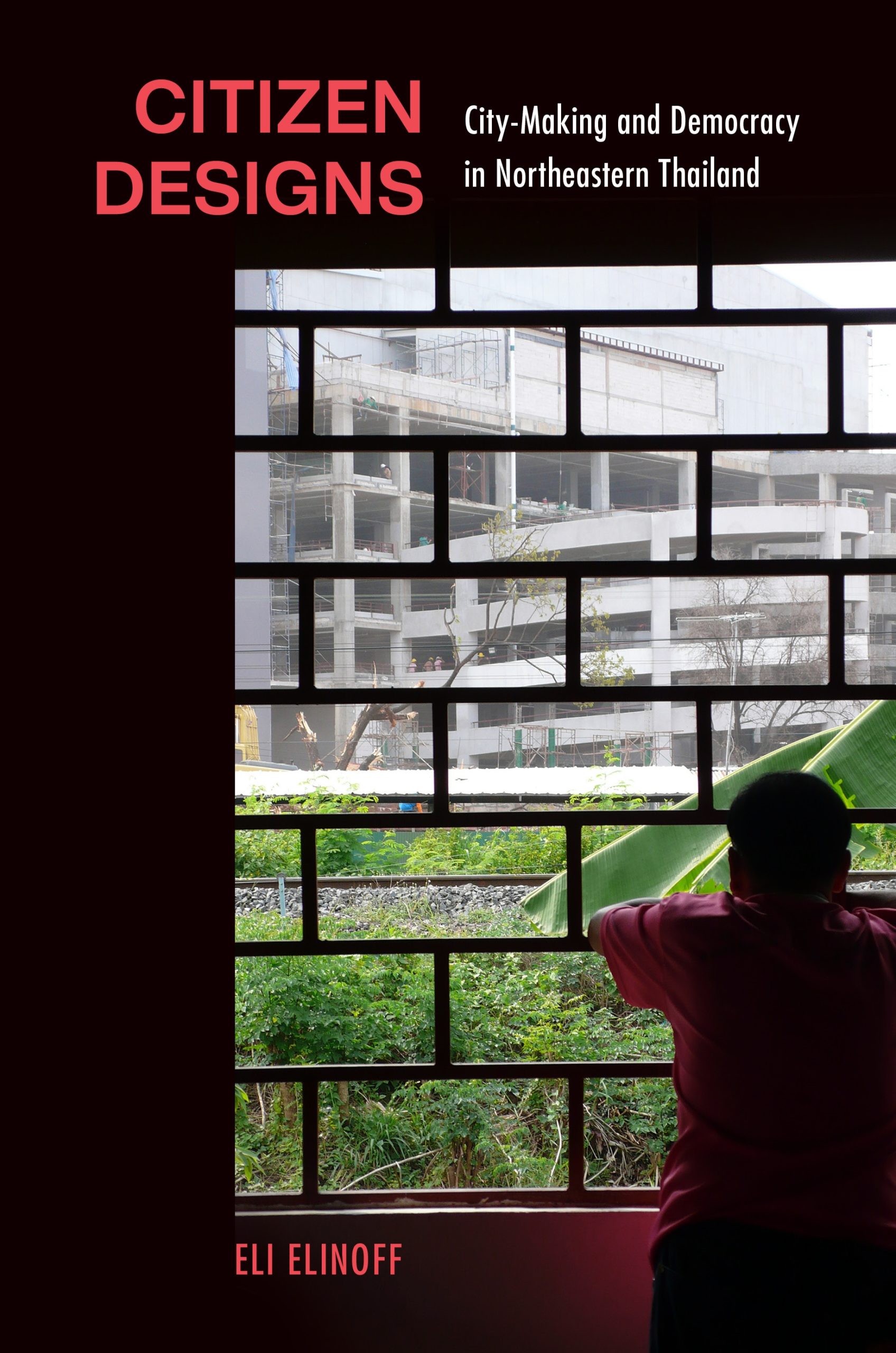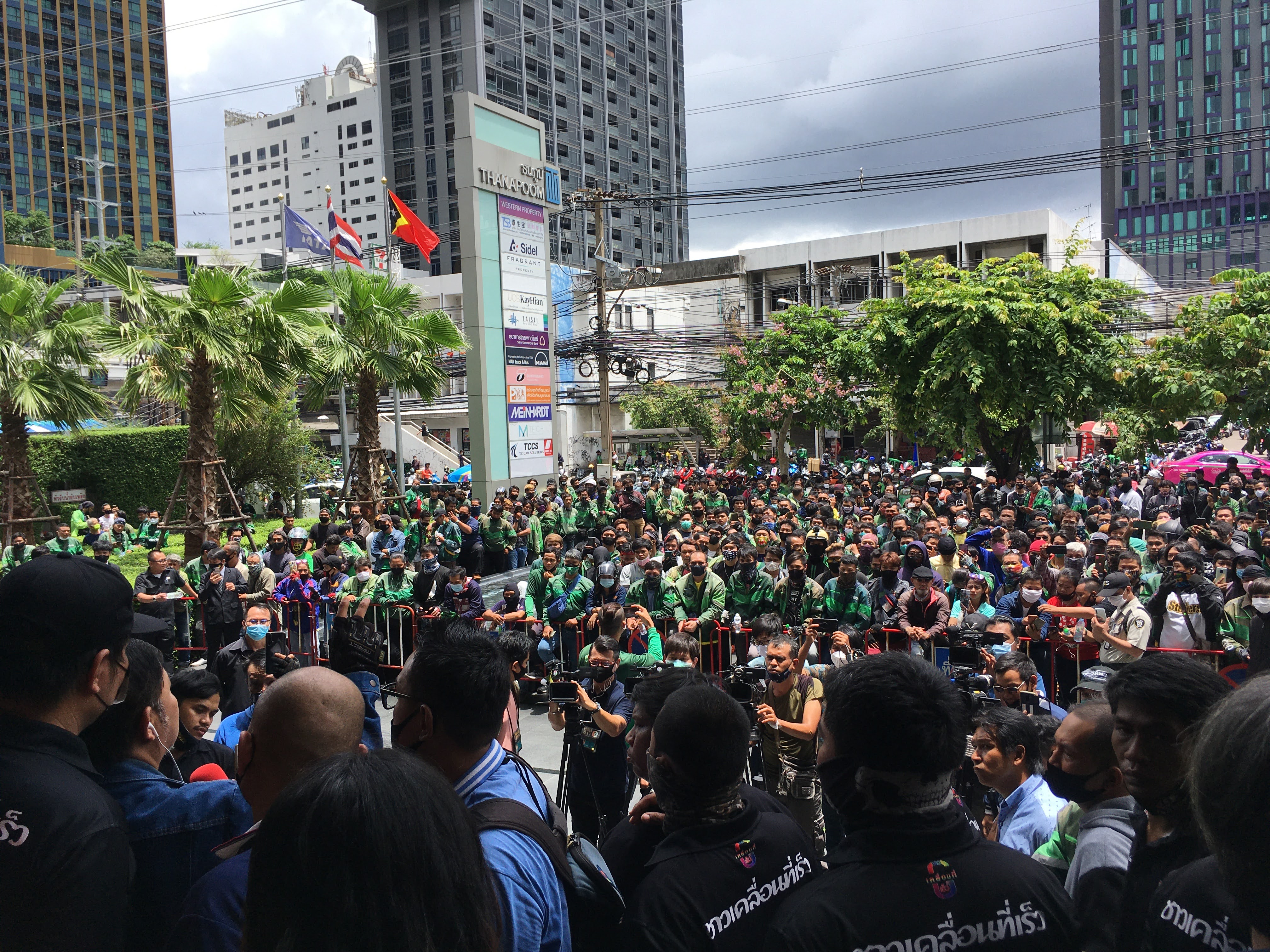In Citizen Designs: City-making and Democracy in Northeastern Thailand, Eli Elinoff explores an in-depth exploration of citizenship struggles and political engagement of residents living in Northeastern Thailand. Unlike traditional scholarship on urban evictions and dispossession, Elinoff acknowledges the existence of multiple subgroups within each group of people, each with different agendas, ideas, and political sympathies. His work sheds light on the complexities of citizenship and the city as a potential space for democracy, making it a necessary read for anyone interested in understanding the current issues surrounding Thai urbanisation and socio-political changes, writes Thanapat Chatinakrob
_______________________________________________
Citizen Designs: City-making and Democracy in Northeastern Thailand by Eli Elinoff is a captivating ethnographic study of the intersection of democratic urban planning projects and political aspirations among squatters in Khon Kaen, a city in the Isan region of Northeastern Thailand. Through meticulous research conducted since 2007, Elinoff provides a nuanced understanding of the struggles for citizenship and democratic participation in Khon Kaen, highlighting how residents used participatory urban planning as a means of reimagining their citizenship, remaking their communities, and acting upon their aspirations for political equality and the good life (8).
One of the key contributions of Citizen Designs is the nuanced understanding it provides of the politics of urbanisation in Khon Kaen. Elinoff challenges simplistic and reductive portrayals of land struggles as a battle among people, showing how every group of people contains multiple subgroups, each coming at the matter with different agendas, ideas, and political sympathies. Some residents saw themselves as part of a broader movement for social justice and human rights, while others were primarily concerned with securing their own land and housing rights (35). Elinoff’s analysis highlights the complexities and tensions within and between these different groups, providing a more nuanced understanding of the politics of urbanisation in Khon Kaen (37).

Another key contribution of Citizen Designs is its illumination of the broader political transformations taking place in Thailand. Elinoff’s analysis shows how residents of Khon Kaen’s railway squatter communities used participatory planning and design as a means of enacting their equality and challenging the state’s authority (57). These efforts were part of a broader push for political equality and democratic participation that has been a defining feature of Thailand’s political landscape over the last two decades. Elinoff’s analysis highlights the aspirations for political equality that underlie this push, as well as the challenges and tensions that arise when these aspirations come up against entrenched power structures (60).
A striking aspect of Citizen Designs is the way it shows how residents of Khon Kaen’s railway squatter communities used participatory planning and design to reimagine their citizenship and remake their communities (64). Elinoff’s analysis highlights the ways in which these efforts were part of a broader push for political equality and democratic participation, as well as the challenges and tensions that arose when these efforts came up against entrenched power structures.
The book also provides a detailed analysis of the role of state planners, urban activists, participatory architects, and city officials in the struggles for citizenship and democracy in Khon Kaen. Elinoff shows how these actors worked to manage situated political claims and emerging politics, using participatory planning and design as a means of co-opting dissent and channelling it into more manageable forms (232). Elinoff’s analysis highlights the ways in which these actors both enabled and constrained the aspirations of residents, providing a detailed and nuanced account of the politics of urbanisation in Khon Kaen.
Through his detailed ethnographic account and insightful analysis, Elinoff makes a valuable contribution to the scholarship on urbanisation, politics, and democracy in Southeast Asia. By delving into the complex dynamics between citizens, activists, state planners, and city officials in the northeastern Thai city of Khon Kaen, Citizen Designs provides a fascinating glimpse into the struggles and aspirations of those seeking political equality and democratic participation. The book challenges simplistic portrayals of land struggles, highlights the complexities and tensions within and between groups of people, and sheds light on the broader political transformations taking place in Thailand (174).
Citizen Designs is a well-researched and engaging book that will appeal to scholars and students interested in urbanisation, politics, and democracy in Southeast Asia. Elinoff’s accessible writing style and nuanced analysis make the book a valuable contribution to the field. The book is particularly relevant for scholars working on issues of citizenship, democracy, and urbanisation in the Global South, where urbanisation is often associated with the dispossession and displacement of marginalised communities.
The book’s focus on the struggles of railway squatter communities in Khon Kaen is particularly valuable, as it sheds light on the ways in which residents use participatory planning and design to challenge the state’s authority and enact their equality. This focus also allows Elinoff to provide a detailed analysis of the politics of urbanisation in Thailand, highlighting the challenges and tensions that arise when citizens’ aspirations for political equality come up against entrenched power structures.
In addition to its contributions to the scholarship on urbanisation and politics in Southeast Asia, Citizen Designs also has practical implications for policymakers and practitioners working on issues of urban development and democracy. Elinoff’s analysis highlights the importance of participatory planning and design processes in ensuring that citizens’ voices are heard, and their rights are respected. The book also provides valuable insights into the challenges of implementing such processes in contexts where power is highly centralised and entrenched interests are resistant to change.
Overall, Citizen Designs is a valuable contribution to the scholarship on urbanisation, politics, and democracy in Southeast Asia. Elinoff’s accessible writing style, meticulous research, and nuanced analysis make the book an engaging and informative read for scholars and students alike. The book’s focus on the struggles of railway squatter communities in Khon Kaen sheds light on the challenges and opportunities of participatory planning and design in contexts where power is highly centralised and marginalised communities are often excluded from decision-making processes. The book’s practical implications for policymakers and practitioners working on issues of urban development and democracy make it an important read for anyone interested in building more inclusive and equitable cities.
______________________________________________
* This book review is published by the LSE Southeast Asia blog and LSE Review of Books blog as part of a collaborative series focusing on timely and important social science books from and about Southeast Asia.
* Banner photo front cover of Citizen Designs: City-making and Democracy in Northeastern Thailand. Eli Elinoff. The University of Hawaii Press. 2021.
*The views expressed in the blog are those of the author alone. They do not reflect the position of the Saw Swee Hock Southeast Asia Centre, nor that of the London School of Economics and Political Science.




